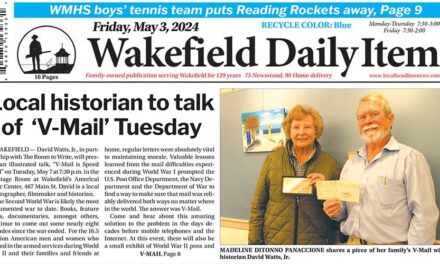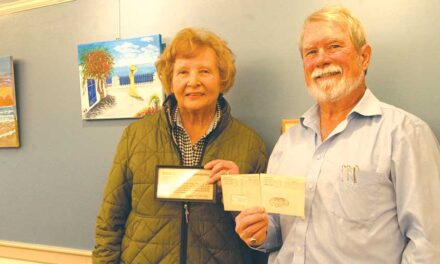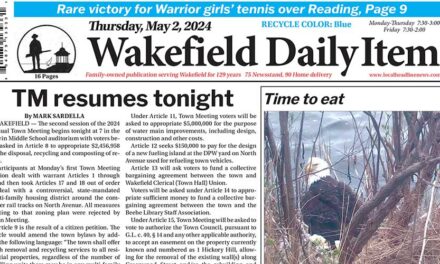Published in the December 30, 2020 edition.
By MARK SARDELLA
WAKEFIELD — The year 2020 began innocently enough, offering little indication of the pain, chaos and devastation just around the corner.
Jan. 6 saw the demolition of a local landmark when Oosterman’s Rest Home at 706 Main St. was razed to make room for two duplex homes.
The local election season got underway in early January, with veteran School Committee member Chris Callanan pulling papers for re-election along with Town Councilor Ed Dombroski and Light Commissioner Jack Warchol. David Ledonne took out nomination papers to challenge longtime member of the Board of Assessors, Yano Tine.
Another political contest was also underway, as candidates angled for a shot to replace State Rep. Paul Brodeur, whose district included parts of Wakefield. The Melrose Democrat resigned his legislative seat after being elected mayor of Melrose in November of 2019. An early January debate held at Brightview Senior Living elicited few differences between Democrat candidates Ann Santos of Wakefield, Kate Lipper-Garabedian of Melrose and Mat Helman of Malden.
In early January, the Wakefield Fire Department welcomed two new firefighters, Michael Scheri and Michael Marroquin.
Also in January, The Town council began its annual review of town departmental budgets for FY 2021.
On Jan. 20, the Wakefield Human Rights Commission held its annual Martin Luther King Day celebration.
On Jan. 27 it became public that Boston real estate giant Cabot Cabot & Forbes was eyeing the former American Mutual/Comverse site at 200 Quannapowitt Parkway for a 600-unit residential development.
Jan. 28 marked the first time coronavirus was mentioned in the Daily Item. It was noted that the Board of Health was monitoring developments concerning an outbreak of the novel coronavirus in China.
In a Feb. 4 special election, Melrose Democrat Kate Lipper-Garabedian easily defeated Santos and Helman, earning the right to face off against Melrose Republican Brandon Reid in a Special Election on Primary Day in March.
A Feb. 5 Item story noted that the Health Department was continuing to monitor developments regarding the novel coronavirus in China. The paper noted at the time that there were 11 confirmed cases in the United States and one in Massachusetts.
On Feb. 5, representatives of the union representing Wakefield teachers appeared before the School Committee to make their case as contract negotiations dragged on between the union and the school administration.
In mid-February, the Town Council approved the Police and Fire Department budgets.
Plans for the Envision Wakefield downtown revitalization continued as another public meeting was held in mid-February.
In late February, the town learned that Jack Roberto planned to retire in June after nearly 30 years as the town’s Building Inspector.
In late February, the Town Council voted to create a Youth Council.
On Tuesday March 3, Melrose Democrat Kate Lipper-Garabedian easily defeated Republican Brandon Reid of Melrose to become the next State Representative for the 32nd Middlesex District.
In early March, Cabot Cabot & Forbes held a meeting with members of the friends of Lake Quannapowitt and others at the former Comverse Building at 200 Quannapowitt Parkway to discuss their plans for 600 residential units at the site. Residents in attendance expressed concerns over the size and density of the project as well as its impact on local schools and town services.
Also in early March, town leaders gathered for a briefing on the coronavirus from Health Director Ruth Clay and Emergency Management Director Tom Walsh. No confirmed cases had yet been reported in Wakefield.
On March 10, Wakefield Police arrested a Chelsea man after he allegedly stabbed a coworker at a business on Audubon Road and then fled into Reedy Meadow. The victim survived three stab wounds.
On March 10, School Superintendent Doug Lyons unveiled his nearly $44 million recommended FY 2021 budget, representing a 4.88 percent increase over the previous year.
Then, on March 13, the local lockdowns began. Schools closed for in-person instruction due to COVID-19 fears and that turned out to be the last day of the school year in terms of classroom learning. Wakefield schools transitioned to a form of remote instruction based on the “Learn-Anywhere” model used on snow days.
Shortly after the schools closed, the town announced that it would limit all non-essential public events through April 5. Panicked shoppers stood in long lines at the supermarket and items like toilet paper, hand sanitizer and paper towels sold out quickly.
And that was only the beginning. Town Hall was closed on March 16 and two days later the town declared a state of emergency.
Yellow tape blocked entry to Parks and children’s playgrounds, which were shut down on March 19.
On March 20, the New Age of Zoom was born as the town announced that all public meetings would be conducted via remote participation only.
With schools closed, in mid-March it was announced that a tentative contract agreement had been reached with the local teachers’ union.
On March 20 the town announced its first case of COVID-19, followed on March 23 by a second local case.
On Monday, March 24, the Town Council held its first remote-only meeting via Zoom.
In late March, the School Committee approved Superintendent Lyons $44 million FY 2021 budget as Finance Committee chairman Dan Sherman predicted severe local revenue shortfalls due to the economic lockdowns.
In late March, Brightview Senior Living announced that it was enacting a “full community lockdown” after a resident of the facility succumbed to COVID.
In early April, the Wakefield and Melrose Boards of Health began a series of weekly joint meetings to deal with the response to the pandemic.
On April 6, the Town Council voted to postpone the Town Election to June 23 due to COVID. They also voted to enact a parking ban around Lake Quannapowitt to discourage walking the Lake.
One afternoon in early April, a group of residents organized a vehicle parade to thank first responders. The long line of vehicles drove by the Police and Fire Department headquarters and the DPW and Light Department facilities with horns honking and flags waving.
In mid-April, town officials announced that the town would be facing an estimated $2.4 million budget deficit in FY 2021 due to revenue shortfalls caused by the COVID-19 lockdowns.
Also in mid-April, the new teachers contract was signed with 9 percent in salary increases spread out over a four-year period.
On April 13, the Town Council made the difficult decision to cancel all July Fourth events.
By mid-April, Wakefield had recorded a total of 141 cases of COVID-19.
On April 20, the town distributed over 9,000 face masks at a drive-through event at the Galvin Middle School parking lot.
On April 25, masks became mandatory for anyone entering a store or picking up takeout at a restaurant after the Board of Health issued an order to that effect.
By April 27, the total number of COVID cases recorded in Wakefield was 209, according to Health Director Ruth Clay.
In late April, National Grid announced that it was temporarily suspending its transmission line work in Wakefield due to the pandemic.
On May 6, a “summit” meeting with officials from Wakefield, Melrose, Lynnfield, Reading, Saugus and Stoneham was held via Zoom to discuss the response to COVID and approaches to re-opening.
Meanwhile, school officials worked to determine what form, if any, high school graduation would take.
On May 11, the Town Council voted to cut the police, DPW, health insurance, capital outlay and library budgets in response to revenue shortfalls due to the COVID lockdowns, but declined to cut $95,000 from its own budget earmarked for an Economic Development Director position.
In mid-May Ann Santos and Julie Smith-Galvin were tapped as chair and vice chair of the Town Council.
On May 11, the Town Council named the members of the newly formed Youth Council.
Also in mid-May, the Board of Health voted to reduce its restaurant permit fees from $200 to $150 in response to the economic devastation resulting from COVID-19 and the lockdowns.
On May 13, the Zoning Board of Appeals got its first look at Cabot Cabot & Forbes proposal for a 600-unit apartment complex at 200 Quannapowitt Parkway.
On May 19, the School Committee announced that it would cut $400,000 from it’s FY 2021 budget as part of an overall $2.4 million reduction in the town budget due to anticipated revenue shortfalls.
Toward the end of May, the Clean Lake Committee appeared before the Town Council to announce the first ever concrete plan to clean up Lake Quannapowitt.
May 25 was the quietest Memorial Day in living memory. All observances were cancelled, although volunteers did plant flags at the graves of veterans under the auspices of the Veterans Advisory Committee and the American Legion.
On May 27, the School Department announced its decision with respect to graduation ceremonies. Graduation would take place in a series of small group exercises over the course of a weekend. Then, due to a backlash from parents and students, the school administration promised to reconsider the possibility of a larger ceremony later in the summer.
But in early June, the School Department issued its final decision to stay with the plan to hold a series of smaller group graduation ceremonies at Landrigan Field over the weekend of June 13 and 14. Social distancing and masks would be required.
During the first week in June, plans were announced for the limited re-opening of Town Hall and other municipal buildings.
On Friday, June 5, members of the Wakefield High School Class of 2020 and their families participated in a car parade that wound through the town as an alternative graduation celebration due to COVID restrictions.
On Sunday, June 7, chants of “No justice, no peace” and “Black Lives Matter” could be heard as hundreds of students, some parents and others marched from the Galvin Middle School to Wakefield Memorial High School to protest the killing of George Floyd and what they termed “systemic racism” in the United States.
At a Town Council meeting on Monday, June 8, Councilor Ed Dombroski publicly addressed a discussion that took place at a Wakefield Human Rights Commission meeting on May 7. At that meeting, which was recorded on Zoom, members of the WHRC made mocking, stereotypical and sarcastic comments aimed at Dombroski. After the remarks came to light, a tearful WHRC Chair Maria Muti apologized, admitting that the comments were “hurtful and inappropriate.” Four WHRC members resigned as a result of the incident.
In early June, the Town Council voted to implement guidelines to allow restaurants to expand outdoor seating and permit retail stores to open with limited capacity.
Over the weekend of June 13 and 14, the Wakefield High School Class of 2020 graduated in a series of smaller group ceremonies at Landrigan Field where graduates walked across a stage to accept their diplomas as their families looked on from the field. It was only fitting that the weather on both days was perfect.
On June 9, Health Director Ruth Clay reported that cases of COVID-19 in Wakefield were “flat” with a total of 311 cases confirmed.
After being postponed twice due to COVID, Annual Town Meeting was finally held on Saturday, June 20 in field house at Wakefield High School. Just over 200 Voters approved the $104,695,276 FY 2021 town operating budget, which included significant cuts due to expected revenue shortfalls. Voters also overwhelmingly approved a $9.6 million expansion and upgrade of the police side of the Public Safety Building.
On Tuesday, June 23, the Annual Town Election was held after being postponed from April due to COVID. David Ledonne won a seat on the Board of Assessors and Candace Linehan won a seat on the Board of Health in the only contested races.
(Part 2 of the Year in Review will appear in tomorrow’s Daily Item.)




